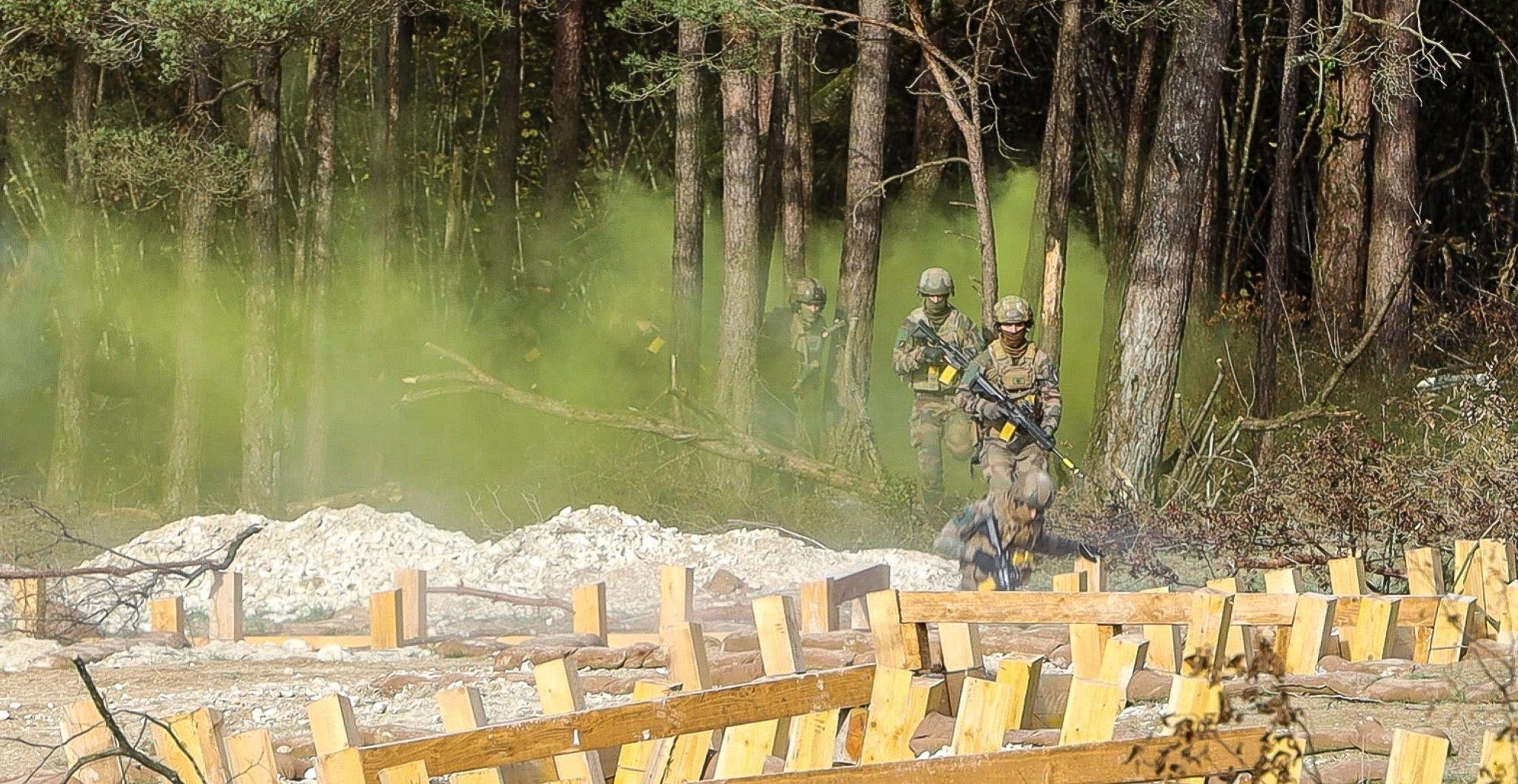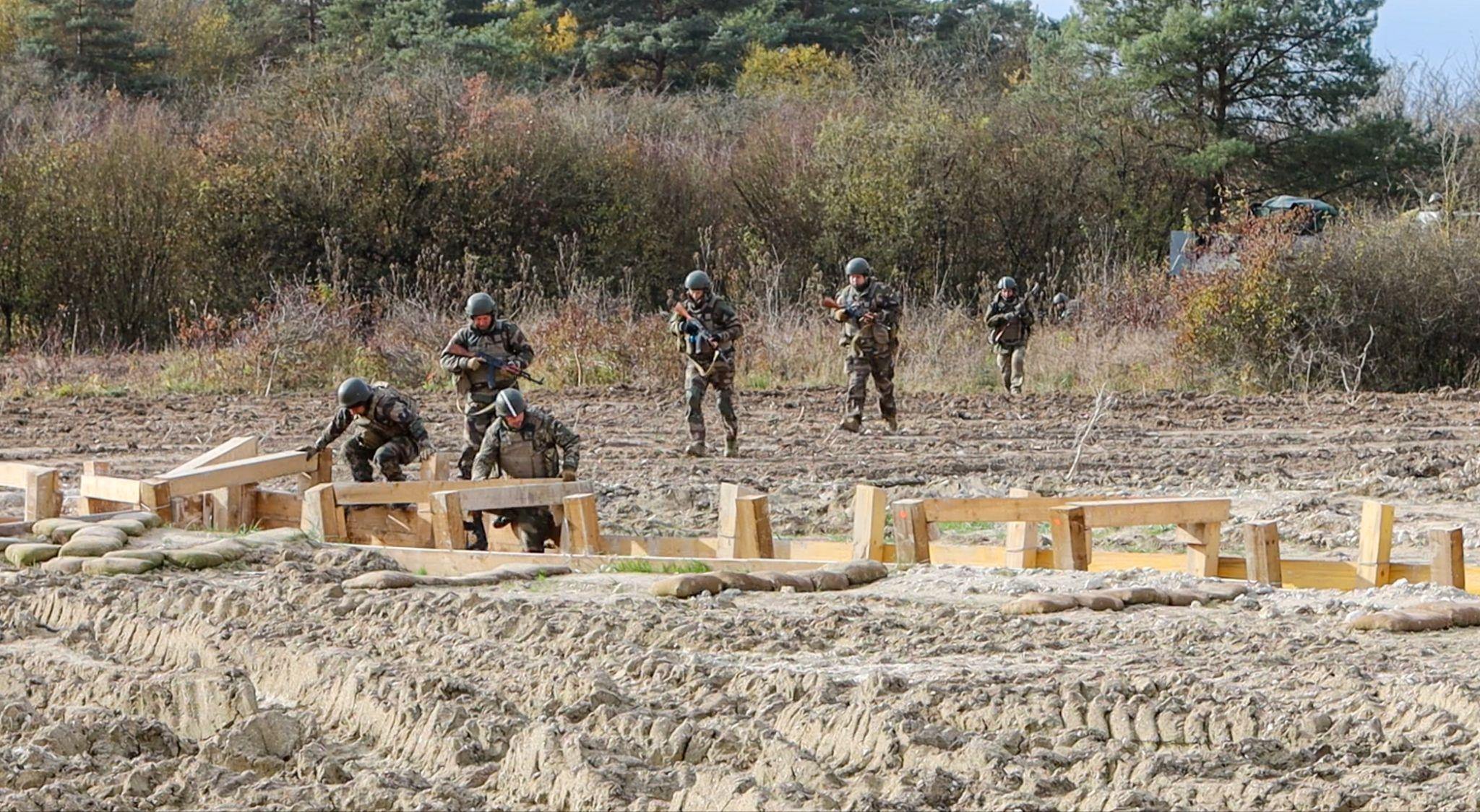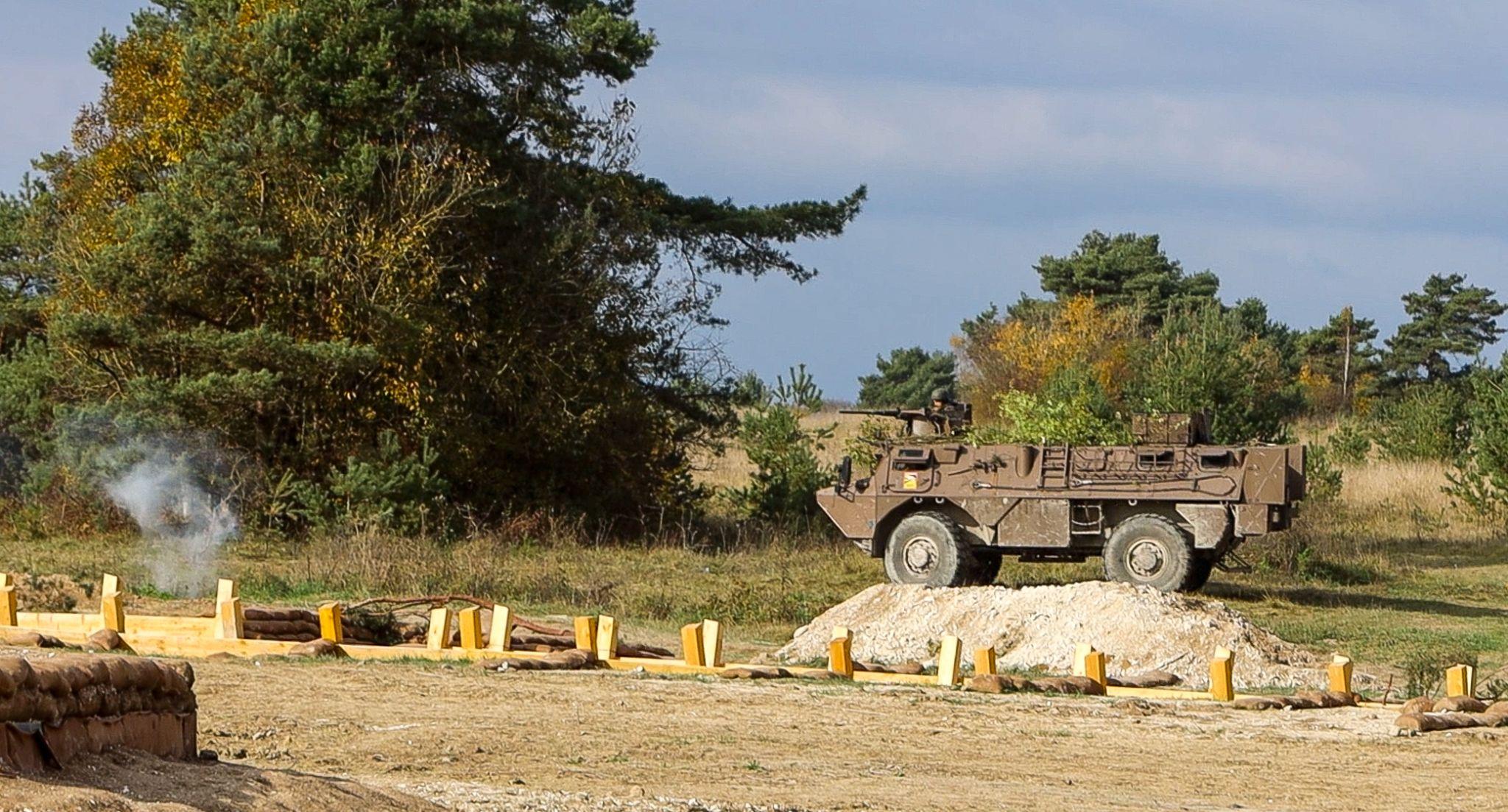Amid a cacophony of explosions and commands in several languages a Ukrainian platoon pushes through rugged terrain, ankle-deep in mud.
The soldiers push forward through a hail of blank-fire bullets and smoke-filled skies, while quadcopters drop explosives under the watch of fixed-wing drones.
While the Ukrainian troops' mission – to reclaim a kilometer of trenches – resembles their usual combat operations, this intense fighting isn't taking place on the frontlines of Eastern Ukraine or in the Ukrainian-held Kursk region. Instead, the action is playing out at a secretive military camp tucked away in eastern France.
War victory in the making
Since Russia launched its full-scale invasion in February 2022, Western allies have trained over 100,000 Ukrainian soldiers. More than 30 nations have pitched in, with France alone hosting nearly 15,000 troops.
At this specific secret base, French instructors have trained 1,500 Ukrainian troops since September.
"France is providing 25,000 hectares, and we're supplying the equipment. There's strong involvement from both Army high command and the soldiers," says Colonel Alban, who oversees the training on site.
“These are luxury trenches,” quips a Ukrainian journalist, pointing to the fresh-dug French fortifications. Here, Ukrainian soldiers must hold their ground for 36 straight hours as part of their latest drill.
"We're pushing to extreme fatigue," the host instructor remarks.
While the training seems brutal, these soldiers are gearing up to face even tougher challenges as their first units push to the front in the coming weeks.

To mirror real-life conditions as closely as possible, Ukrainian soldiers train with the equipment they'll take to the frontlines — such as French VAB and AMX-10 RC armored vehicles, and Kalashnikov assault rifles specially imported from Ukraine for the occasion.
For nine intensive weeks, Ukrainian troops master everything from tactical command to drone warfare. The comprehensive program — unique in training all command levels — turns theory into combat reality.
“This ensures their training carries straight into combat,” a senior officer says, explaining that France's strategy merges arms transfers with combat training, forging a battle-ready brigade equipped with both French weapons and expertise.
Ukrainian brigade born in France
This newly established joint brigade is part of the over 14,000 Ukrainian soldiers trained by the French army as part of the European Union Military Assistance Mission (EUMAM Ukraine), a Brussels-led effort to bolster Ukrainian operation effectiveness on the battlefield with specialized training.
Launched in October 2022 with the initial goal of training 15,000 Ukrainian troops, the initiative now aims to prepare 75,000 soldiers by 2024. As of November 2024, nearly 63,000 conscripts have completed the course, with the remaining trainees set to finish the drills by the end of winter.
Among them is the Anna of Kyiv tactical brigade, named after a medieval French queen of Ukrainian descent. With its two command posts, three infantry battalions, and support units, this formation — built hand-in-hand with Ukrainian command — breaks new ground in allied training.
“This is the first time that a Western country has trained Ukrainian soldiers in the echelon brigade,” a senior French officer told Euromaidan Press.
However, Ukrainian soldiers aren’t the only ones getting a crash course in this cooperation.
“We're also learning from them. We have the experience of overseas operations, and they have the experience of combat at home, with a high-intensity confrontation,” Colonel Alban says.
“They were clearly better than us at the whole drone strike game,” a French soldier adds with a smile.
Yet, with no more than 10% of trainees having already been to the front, the challenges often outweigh the benefits.
"In fact, everything we showed them was brand new. So we had to teach them about the different types of ammunition, how to identify, handle, and neutralize them, and the dangers they pose," Colonel Alban admits.

Inside France's secret war laboratory
After completing the training, the Anna of Kyiv brigade is expected to reinforce the front lines and help rejuvenate the Ukrainian army, which has been severely strained by nearly three years of war and limited rotation.
While French-provided training focuses on the essential details to create a combat-capable brigade, along with the equipment and expertise provided, it also fulfills another make-or-break need for Ukrainian trainees — security.
"Training centers are especially targeted in Ukraine, so there was a sense of relief in coming to France," says a French serviceman.
The Ukrainian soldiers, however, couldn’t add to that statement, as strict operational security measures prohibit them from speaking to the media.
Still, their French counterparts assure that tight control over every aspect of the training, coupled with a well-thought-out security system — maintained in coordination with French counterintelligence and intelligence services — reduces the risk of espionage to zero.
An emerging power behind the curtain
While this training ground sharpens Ukrainian forces to wield French weapons, the masterplan behind this initiative aims even higher, with impact reaching far beyond the battlefield.
"We just want to show that this is a significant effort the French army is making for a friendly country whose situation we understand today," Colonel Alban says.
However, defense journalist and military analyst Romain Mielcarek argues that France’s bold move to spearhead a major training operation at Ukraine’s request underscores its wider foreign policy ambitions.
"The challenge for France is to demonstrate, 'Look, we're not just a partner for Ukraine — we're a leading partner," he says.
Since Russia's full-scale invasion, France has positioned itself as a key diplomatic ally for Ukraine in Europe. However, the German Kiel Institute ranks Paris only ninth in military aid, with its contribution standing at just 3 billion euros.
The French army asserts that the goal of their military cooperation is to ramp up Ukraine's capabilities in crucial areas like artillery, armored mobility, and ground-to-air defense.
Subsequent waves of French military aid have tackled this objective. The first phase — launched shortly after the outbreak of Russia’s 2022 invasion — supplied vital defensive equipment, such as anti-tank and anti-aircraft systems, personal weapons, and protective gear, to counter the Russian offensive.
As the war evolved, the focus moved to advanced systems designed to secure a decisive edge and ensure long-term support. These include Unitary Rocket Launchers (LRU), CAESAR self-propelled guns, Crotale NG missile batteries, and armored vehicles — backed by extensive training for Ukrainian forces.
Another key aspect of France’s stance is the renewed possibility of sending European troops to Ukraine — a prospect that has sparked controversy among Ukraine’s allies. With the threat of US disengagement in Trump's second term in office, Paris is keeping the option to lead a European Ukraine coalition open.
A diplomatic foot-in-the-door play
The debate over deploying European troops to Ukraine, brought to the forefront by French President Emmanuel Macron last February, sparked international backlash, with Germany becoming the leading voice of opposition.
However, the ambitious French proposal was brought back into the spotlight in recent weeks, when UK Prime Minister Keir Starmer landed in France for the 11th November commemorations marking the end of World War One.
In November, a British military source confirmed the speculations by telling Le Monde that the UK and France were in talks to strengthen defense cooperation, with a sharp focus on Ukraine and broader European security.
French politicians argue that deploying troops to Ukraine would enable Europeans to sit at the negotiating table with Ukraine, giving them leverage in potential peace talks and ensuring they’re not sidelined by the Russian-American power play.

Paris' renewed troop deployment call came at the time when Ukrainian President Volodymyr Zelenskyy staked his claim for “security guarantees” from his allies before engaging in peace talks with Russia.
This urge followed the US elections, which brought Donald Trump back to the White House, sparking concerns that he might potentially pressure Ukraine into negotiations with Russia, potentially with territorial concessions favorable to the Kremlin.
Kyiv’s call rang through the French Foreign Ministry, with spokesman Christophe Lemoine stating, “Russia is the aggressor” and “Russia is the one escalating.”
“This issue of security guarantees, whether provided by a NATO coalition or ad hoc coalitions – and thus a form of contribution from our country – is being discussed,” General Pierre Schill, Chief of Staff of the French Army, echoed on 21 November.
“No red line on our side”
While debating the deployment of European troops to Ukraine remains a stumbling block for most EU states, Paris is refusing to rule out any option – even the most unconventional ones.
According to French outlet La Lettre, Défense Conseil International (DCI) — a private military company with government ties — has offered Defense Minister Sébastien Lecornu a plan to deploy former French soldiers to Ukraine.
This commitment — a potential turning point for France — would involve training in the use of CAESAR guns and drones, as well as providing medical support.
The proposal came around the time when five French MPs pushed the minister to expand military training from France and Poland to Ukraine. They called for a European coalition of military instructors, with France leading the charge alongside Britain, Poland, and Ukraine's partners in the Baltics and Scandinavia.
The statement stressed that Russia’s recruitment of thousands of North Korean soldiers should push France to ramp up support for Ukraine, focusing on training rather than deploying combat troops.
“It’s about helping Ukraine defend itself, saving lives, and ensuring they don’t lose this war,” said Frédéric Petit, one of the most vocal advocates for Ukraine in the French Parliament, who was among the appeal’s signatories.
Petit argues that sending instructors aligns with Europe’s broader strategy of reinforcing Ukraine's military capacity without direct confrontation with Russia.
"Our response must increase direct support — training soldiers to defend their land and uphold democratic values," Petit says.
“It is a moment to mark the fact that there are French personnel — non-combatants — but officially in Ukraine, without hiding it, but without turning it into some kind of psychological media totem,” the MP stated on 1 December.
"France can take a leading position in this coalition, alongside our European partners," he added.
Read also:
• Georgia’s democratic crisis deepens as thousands rally against “Russian puppet”
• Inside Ukraine’s kitchen drone labs halting Russia’s war advance
• Colombian soldiers trade jungle combat for Ukraine’s tech-driven war
• Ukrainian sappers race against the world’s largest minefield
• How Georgia’s pro-EU movement built its own intelligence network

